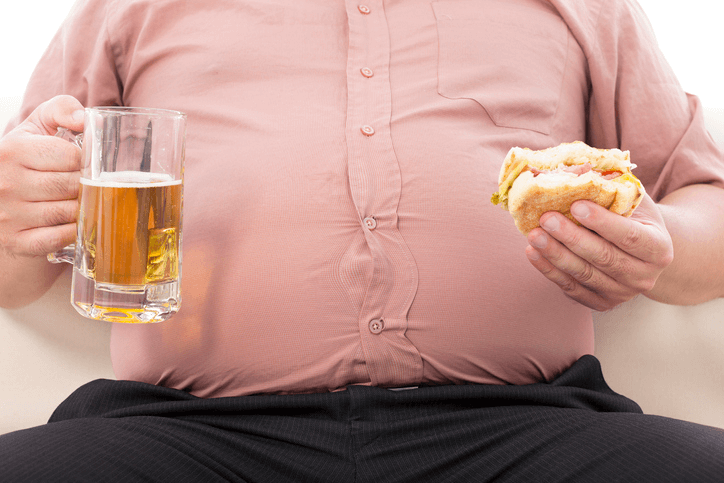Get Started
Complete the short form belowto Contact a Nexel Medical physician

A holistic approach to testosterone replacement therapy (TRT) that includes lifestyle, diet, and fitness counseling is the best way to maximize the benefits of TRT.
Testosterone is a critical hormone for both men and women. Unfortunately, we lose this critical hormone as we age. This can have a particular health impact on men as they age. By the time a man is over 30, the level of testosterone in his blood can decrease by as much as 2% every year. As your testosterone drops, you can start to feel the symptoms of low testosterone such as:
The good news is that most, if not all, of these symptoms can be slowed or even reversed with TRT, and there are many lifestyle changes you can make that could naturally boost your testosterone levels to help you maintain or improve the benefits of prescription testosterone injections.
Like all of you hormone levels, testosterone production is strongly influenced by what you eat. Nutrients like protein, healthy fats, vitamins, and minerals provide the raw materials your body needs to produce and metabolize hormones. Conversely, poor nutrition can lead to weight gain, inflammation, and metabolic problems — all of which suppress testosterone.
Even when you’re on Testosterone Replacement Therapy (TRT), diet remains a powerful factor. The right foods can enhance your therapy’s benefits, while the wrong foods may blunt results or create unwanted side effects.
Here are some foods that can help increase testosterone:
Seafood and Fish – Vitamin D is critical for testosterone production, and shellfish are high in vitamin D. Oily fish such as sardines, mackerel, and salmon are also rich in vitamin D.
Coconut – Many men, after the age of 40, reduce their consumption of “bad fats” to lose weight and lessen the risk of cardiovascular disease. But low-fat diets can also lead to low testosterone; coconut is a way to add a “good fat” to your diet to boost testosterone production.
Pumpkin – Pumpkin, and particularly pumpkin seeds, have a lot of zinc. Men with low zinc also tend to be low in testosterone.
Whey Proteins – A recent study by the University of Connecticut found that men who increased their intake of whey proteins produced less cortisol. Cortisol is a “stress” hormone that interferes with the production of testosterone. Good sources of whey protein include ricotta cheese, which also includes several essential amino acids, kefir, and yogurt.
Berries – Strawberries and other dark/red berries, such as raspberries and blackberries, also contain powerful antioxidants that can block or reduce the production of cortisol and other testosterone-inhibiting hormones.
Cruciferous Vegetables – Leafy greens and other cruciferous vegetables, such as broccoli, contain phytochemicals that block or inhibit the production of estrogen. Estrogen is a man’s body that lowers the production of testosterone, so these vegetables have a positive impact on testosterone production. Other veggies in this group include: kale, cauliflower, cabbage, Brussels sprouts, and bok choy.
Just like there are foods to add to your diet to maximize your TRT results, there are foods to avoid. To get the best results, limit foods that interfere with hormone balance or promote fat storage:
Are There Any Vitamins or Supplements That Could Boost Testosterone?
There are some vitamins, herbs, and nutritional supplements that could help reduce some of the symptoms of age-related testosterone deficiency.
Vitamin D – Vitamin D is a precursor to testosterone production. It is crucial that men spend enough time in the sun (the main source of vitamin D) or take vitamin D supplements.
Nutritional supplements – Certain herbs and nutritional supplements have been shown to increase testosterone production. This includes ginseng, ginger, ashwagandha root, DHEA, and Yohimbe.
It is an inescapable fact that your testosterone levels will decline as you get older. Just as you can do things to minimize that decline, you could actually be doing things that accelerate the problem.
Poor diet, bad sleep habits, stress, and lack of exercise can all contribute to low testosterone, or “low-T.”
Here are a few other “testosterone killers” you may not be aware of.

Testosterone is a very important male hormone. Unfortunately, testosterone levels drop as men age. For most men, testosterone levels peak in their 20s. After that, it is a steady drop of about 2% per year. As your testosterone levels fall, you may begin to feel the signs and symptoms of low testosterone, sometimes referred to as “Low-T.” You may become tired more easily, feel an overall lack of vitality, gain weight more easily, and even face some sexual performance issues.
While testosterone therapy can help, did you know that there are also some dietary and lifestyle changes you should consider that can help increase your testosterone levels naturally, and keep them higher?
Women, too, should consider these top 10 ways to naturally increase testosterone, as women over 35 could also benefit from keeping their testosterone at more normal levels.
1. Exercise and weight training – One of the best ways to increase your level of testosterone is to lose weight and pack on some lean muscle mass. To do this, there are certain exercises, such as weight training and high-intensity interval Training, that are known to increase the production of testosterone. Such exercises have the added benefit of also increasing human growth hormone (HGH) production.
2. Testosterone boosting foods – We know that there are certain foods that can naturally increase testosterone. Consider adding these foods to your diet: seafood and fish, cruciferous vegetables, coconut, avocados, and other sources of “good” fats, whey proteins, and berries.
3. Get a good sleep – Testosterone, along with growth hormone, another critical hormone, is produced most efficiently during deep sleep, so if you have poor sleep habits, you will be lowering your body’s ability to produce these critical hormones
4. Reduce sugar intake – Again, reducing your intake of sugar is a good idea for weight loss, but it also helps your hormones to remain in balance. Reducing your intake of processed sugars will reduce testosterone-killing hormones in your blood, such as cortisol, while at the same time, it will boost your production of testosterone and HGH.
5. Reduce alcohol consumption – Drinking has a negative impact on testosterone levels. Recent studies have found that even moderate drinking can significantly lower testosterone. So skip the happy hours, and try to limit your drinking to no more than one glass of wine or beer a day.
6. Adopt some stress reduction techniques – Stress raises your level of another hormone — cortisol. Cortisol is a testosterone killer. High levels of cortisol also lead to insulin resistance, which leads to obesity, which also lowers testosterone. Practice stress reduction techniques such as rhythmic breathing, yoga, or Tai Chi.
7. Sunshine and Vitamin D – Vitamin D is a precursor to testosterone production. Sun exposure stimulates vitamin D production. It is also found in vitamin D fortified products like milk and yogurt, and can be taken in supplements. A study found that men taking a vitamin D supplement of around 3,000 IU per day increased testosterone levels by almost 25%.
8. Other nutritional supplements – In addition to vitamin D, there has been research that has indicated there are other minerals and nutritional supplements that can raise testosterone. Vitamins A, B, C, and E, as well as the mineral zinc, have all been shown to raise testosterone. There have been some studies to show that Ginger, ashwagandha, and horny goat weed may all raise testosterone to some degree.
9. Make love more often – There is an old saying that says “use it, or lose it,” and that may apply to testosterone! There is clinical evidence that having sex more often can increase your testosterone level.
10. Avoid screens late at night – Try not to make watching TV, or looking at your phone or computer, the last thing you do before bed. Studies have shown that exposure to “blue light,” which is the main output of media screens, causes an artificial spike in cortisol levels. If you cannot break the habit of interacting with media before bedtime, consider purchasing a pair of blue-light blocking glasses.
Follow these tips, and you should be able to raise your testosterone level. However, if your levels of testosterone are so low that low-T is negatively impacting your life, they may not be enough. If you make these testosterone boosting lifestyle changes, and you still feel weak, lethargic, and are putting on weight and experiencing sexual performance issues, you may be a candidate for testosterone therapy.
At Nexel Medical Clinics, we do not provide TRT for men in a vacuum. Our seasoned medical professionals recognize the value of a holistic approach to testosterone replacement. We understand that hormone replacement is as much an art as a science. Our approach to TRT and growth hormone therapy for adults blends the latest scientific advancements with the precise touch of a skilled artisan. Every treatment is a masterpiece, uniquely tailored to reveal your best self!
Our commitment to your well-being does not begin and end with your diagnosis of low testosterone and prescription for TRT. We believe in empowering our patients with knowledge. We provide transparent information about testosterone injections and all hormone replacement therapies, their benefits, potential risks, and what to expect during treatment. We like to think of ourselves as your partners in health. All of our Nexel Clinics nationwide understand that returning your HGH and testosterone levels to normal is just one piece of the puzzle. Our holistic approach encompasses personalized nutrition plans, fitness, and lifestyle interventions that contribute to your overall well-being. We’re here to help you achieve optimal health on all fronts.
Frequently Asked Questions About Maximizing Your TRT Results
1. How important is exercise when on TRT?
Exercise—particularly strength training and cardiovascular activity—greatly enhances the benefits of TRT by improving muscle growth, fat loss, and energy levels. Men who combine therapy with regular workouts typically achieve the most noticeable results.
2. Do I need to change my diet while on TRT?
Yes. A balanced diet high in lean protein, healthy fats, and complex carbohydrates supports optimal hormone balance and helps you achieve better outcomes in body composition and energy.
3. How much sleep should I get to maximize TRT benefits?
Consistently getting 7–9 hours of quality sleep per night is essential. Sleep is when testosterone levels naturally peak, and lack of rest can blunt your TRT results.
4. Can managing stress improve my TRT outcomes?
Absolutely. Chronic stress elevates cortisol, a hormone that counteracts testosterone’s effects. Stress management techniques like mindfulness, exercise, or breathing practices support better results.
5. How often should I follow up with my doctor during TRT?
Regular monitoring—every 3 to 6 months—is crucial. Bloodwork helps ensure your testosterone levels are optimal, while also keeping an eye on related markers like hematocrit, lipids, and PSA.
6. Does alcohol affect TRT results?
Excessive alcohol can impair liver function and hormone balance, potentially reducing the benefits of TRT. Moderate consumption is generally safe, but limiting intake improves outcomes.
7. Will TRT alone help me lose weight?
TRT can improve metabolism and energy, making weight loss easier, but it works best when combined with diet and exercise. Men who actively manage their lifestyle see the best results.
8. How quickly should I expect to see results from TRT?
Most men begin to notice improvements in energy, mood, and libido within a few weeks. Muscle growth, fat loss, and strength gains typically take a few months of consistent therapy and lifestyle support.
9. Are supplements useful while on TRT?
Certain supplements, like vitamin D, zinc, and omega-3s, may support hormone function and overall health. Always consult with your physician before adding supplements to your TRT regimen.
10. Can TRT improve mental focus and mood?
Yes. Optimized testosterone levels are linked to sharper cognitive function and a more stable mood. Pairing TRT with brain-healthy habits—exercise, sleep, and balanced nutrition—maximizes these benefits.
Now that you know more about how to optimize your testosterone levels why not Contact Nexel Today, and learn more about the life changing benefits of TRT?
Complete The Short Form Below To Contact a Nexel Medical Physician
